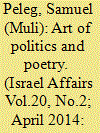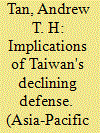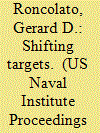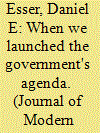| Srl | Item |
| 1 |
ID:
131857


|
|
|
|
|
| Publication |
2014.
|
| Summary/Abstract |
The article demonstrates the potency and volatility of political lyricism by comparing two masters of the trade, the French Jacques Prevert and the Israeli Aryeh Sivan. Although writing in two dissimilar cultures and witnessing disparate political environments, the poetry of Prevert and Sivan is similar in many ways. They are both keen observers of their societies' woes and both are equally critical. Their accounts are s are emphatic and caring and strewn in their passionate, affectionate and brutally honest verses, Prevert and Sivan are the quintessential models for contemporary political poetry. Both poets, despite their disparate cultures and dissimilar local experiences, painstakingly probe and penetrate the political realities around them with velvet nails
|
|
|
|
|
|
|
|
|
|
|
|
|
|
|
|
| 2 |
ID:
138316


|
|
|
|
|
| Summary/Abstract |
While my last four years in Jerusalem have been deeply enriching and engrossing, coming up close and dealing first-hand with the ubiquitous Israeli-Palestinian conflict, they haven’t exactly been the happiest of times for those like me who are interested in a just and peaceful settlement of the conflict for Palestinians and Israelis alike. With the notable exception of the major diplomatic effort led by U.S. Secretary of State John Kerry, the situation on the ground and the political outlook has been bleak. At times it has been downright gut-wrenching. Last summer, over 2,200 people were killed in the Gaza Strip, many of whom were innocent children and civilians. This was the third military confrontation between Israel and the Palestinians in six years, only more violent and more destructive. The destruction I saw driving through Shuja’iyya — one of the largest residential neighborhoods in the Gaza Strip — is testimony to that. Once again, this latest round could have easily been avoided. Today, Gaza remains cut off and isolated, with an uncertain political outlook. A return to violence looks disconcertingly unavoidable.
|
|
|
|
|
|
|
|
|
|
|
|
|
|
|
|
| 3 |
ID:
131847


|
|
|
|
|
| Publication |
2014.
|
| Summary/Abstract |
Taiwan's declining defense capability has increasingly tilted the balance of power in the Taiwan Strait towards China. While the current status quo suits Taiwan's domestic political realities and postpones the Taiwan question to the future, its declining defense capabilities vis-à-vis China hold important implications for Taiwan. They include the reduction of its political bargaining power with China, the undermining of stability in the Taiwan Strait as China increasingly has a viable military option, and ultimately decreases the probability that the status quo can be maintained. Left unattended, Taiwan's declining defense capabilities narrow Taiwan's options and could lead to unpalatable outcomes, including sudden crisis and conflict, and the ultimate resolution of the Taiwan problem on China's terms.
|
|
|
|
|
|
|
|
|
|
|
|
|
|
|
|
| 4 |
ID:
124114


|
|
|
|
|
| Publication |
2012.
|
| Summary/Abstract |
We must reconsider our strategic perspective and organizational culture amid an emerging naval revolution.
|
|
|
|
|
|
|
|
|
|
|
|
|
|
|
|
| 5 |
ID:
114930


|
|
|
|
|
| Publication |
2012.
|
| Summary/Abstract |
Political realities in the capital cities of impoverished countries emerging from violent conflict illustrate how local actors can be hindered in conducting political affairs independently from the interests and influence of national governments as well as international agencies. This experience problematises the argument that the main cause of political impasse in African cities governed by opposition parties is incomplete decentralisation, whereby a devolution of responsibilities is not matched by a downward reallocation of resources. Although resulting competition constrains local governments' opportunities to deliver basic services, we need to look beyond the national scale to uncover the drivers of institutional change and gauge the promise of donor-driven local political empowerment. Urban politics in Africa continues to be shaped by global aid discourses, which are translated into local policy frameworks through interest convergence between international and national actors. The case of Freetown, Sierra Leone provides an illustration of such macro-level alignment and resulting local frictions. At the same time, it also demonstrates how local politics have challenged the technocratic, apolitical reinvention of urban governance in the global South perpetuated by the international aid industry.
|
|
|
|
|
|
|
|
|
|
|
|
|
|
|
|